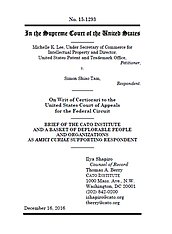Lee v. Tam
Learn more about Cato’s Amicus Briefs Program.
When Simon Tam formed an all Asian-American rock band, he knew it needed a name that would capture the band’s identity and ethnic pride. He chose “The Slants” to, in his own words, “take on these stereotypes that people have about us, like the slanted eyes, and own them.” The Slants knew they might have some critics, but they weren’t expecting that one would be the U.S. Patent and Trademark Office (PTO), which punished them for their naming choice by denying their trademark application. The PTO acted under a provision of the Lanham Act (the federal trademark statute) that bars the registration of any trademark “which may disparage … persons, living or dead, institutions, beliefs, or national symbols.” After a three-judge panel of the U.S. Court of Appeals for the Federal Circuit upheld this denial, the full court reheard the case and reversed, striking down the disparagement clause as violating the First Amendment. The case is now before the Supreme Court. Cato, joined by a basket of deplorable people and organizations that includes satirist P.J. O’Rourke, former ACLU president Nadine Strossen, and Flying Dog Brewery (which makes the tasty “Raging Bitch” Belgian-style IPA), has filed a brief urging the Court to affirm the Federal Circuit. We ask a simple question: Should the government get to decide what’s a slur? Do we really want PTO lawyers determining which messages are “disparaging” and which aren’t? For example, Cato’s brief was written by a cracker, a dago, and a frostback. Can we get away with saying that? It depends whom you ask. Is “water buffalo” a racial slur? What about “niggardly” or “tar baby”? Enormous controversies have raged over exactly these questions, yet the PTO thinks it can draw an objective line. And even if we could determine which words are actually “disparaging,” should the government really be putting its thumb on the scale to take such controversies out of the public square? Insulting terms and disparaging language have played an important role in American history. Why should we discourage coining phrases like the “Know-Nothing Party” when, for many, they have captured a truth more than any “official” name ever could? Moreover, the process of reclaiming slurs has been crucial to the development of many groups’ identities. Jesuits, Methodists, Mormons, and Quakers all owe their popular names to reclaimed terms that were originally disparaging. The Slants, just like N.W.A., Pansy Division, the Hillbilly Hellcats, and many bands before them, are engaging in exactly the same proud tradition. The disparagement clause places an economic penalty on brands that choose to express a certain message—the definition of an unconstitutional condition. Could the government deny copyright protection to a book it doesn’t like? Could the police decline to protect a demonstration with which they disagree? Allowing the disparagement clause to stand would raise these and other troubling questions. Instead, the Court should draw a clear line, get rid of the disparagement clause, and let The Slants rock on!



